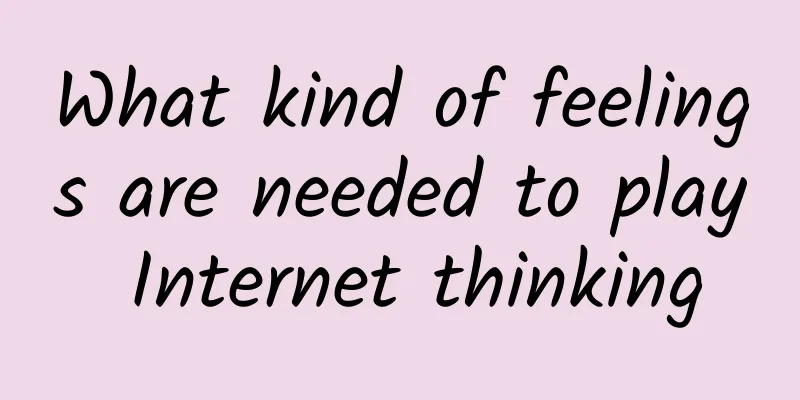Lao Luo has so many fans, why is his business not very successful?

|
Not long ago, I read the remarks of Wu Shichun, partner of Meihua Angel Venture Capital, in my circle of friends. He said that there are five types of entrepreneurs that he does not invest in, and the second type is entrepreneurs who rely on relationships and resources, and he is not optimistic about such people. Wu Shichun is a well-known angel investor in China and a veteran in the venture capital industry. Internet people often say the meaningless phrase "channels are king", but Mr. Wu goes the other way and says he will not invest in people who rely on channels. This is a very interesting phenomenon, but it makes sense. In fact, more than one investor has told me to "beware of channel entrepreneurs", and few angel investors explicitly list the "channel" condition when selecting entrepreneurs. The elements that everyone is optimistic about in entrepreneurs are more likely to be smart, passionate, tenacious, honest and trustworthy, etc. It is said that Internet entrepreneurship is a grassroots entrepreneurship, and it is an opportunity for entrepreneurs with "no connections" to get rich. Although this is mainly a nice thing to say, most successful entrepreneurs are not really self-made, but "not optimistic about channel entrepreneurs" is not only politically correct, but also has its reasons. Investors do not think that there is a single minute of channel in the exciting road show. It can even be said that when evaluating whether a startup project is worth investing in, the channel factor is often the last thing to consider. I have a friend First of all, we need to be clear about what is a channel? Everyone is a channel. However, the reliability of this channel is about the same as the reliability of "I have a friend". Graduates from prestigious universities often say that they have access to alumni resources, and employees who left BAT always talk about BAT alumni reunions. Do these count as channels? Yes, but investors won’t buy into your claims. Saying that you graduated from a prestigious university or worked for BAT generally gives you extra points, but this extra point is more of an endorsement of your ability rather than a recognition that you have “channels.” What if your parents, friends, relatives, and colleagues hold all kinds of resources? Investors don’t believe this either, unless you have already used these resources in the form of business cooperation, rather than secretly occupying or misappropriating them. To put it bluntly, the level of "I have a friend who can do XXX just by talking to him" is about the same as "I have an idea, all I need is a programmer". Although the channel is good, you have to be able to use it. Just because your family owns a bank doesn't mean you can get a loan whenever you want. Moreover, will your friend really not quarrel with you after being used by you? Luo Zhenyu of Luoji Siwei is "that friend" of Shen Yin, the major shareholder. As we all know, Luo Pang has such a close relationship with Luoji Siwei that he has brought a lot of fans to Luoji Siwei. He is in charge of both content and products, and has supported the entire brand. He is simply a good friend that is hard to come by. Luoji Siwei is indeed very successful. The video playback on Youku has accumulated nearly 100 million times, the WeChat account has more than 1 million subscriptions, and 30,000 members have contributed tens of millions of membership fees, all of which prove that this product is both popular and well-received. And how much equity does Mr. Luo Zhenyu, a friend who has made an indispensable contribution to this high-quality channel, own? More than 17%, while the founder Shen Yin owns more than 82%. Such an excellent channel only accounts for such a small share in a commercial project. You can feel the value of the channel. However, the road ahead for Luoji Siwei is not easy. As you can see, Luoji Siwei has reportedly disbanded. There are many reasons, and the distribution of benefits is probably a big factor. People who own channels seem to be in a good position on the surface, but how much do business partners care about this channel? You can understand this by thinking about how much you care about the people who go out to use their reputation in your company. Others take your path, but you have no path to take So, if celebrities personally start a business with their own fan club, this can be considered a channel, right? Again, you have to use it. Do you think your channels can be used for your business? It's hard to say. Some of your fans are crazy fans - they think you are good at everything, they think you are awesome, they buy everything you sell, but crazy fans are not all of them. Normal fans are still the mainstream. Moreover, if you are not a big star, but just a small celebrity with 30,000 to 50,000 fans on Weibo, I am afraid that you and your investors will not be confident that your crazy fans are enough to support your project. One of the Weibo joke tellers, "Great Annie", has caused quite a stir in the past six months because of her "1% dream". In her first comic strip marketing, Annie positioned herself as an entrepreneur with dreams, and also created many images that were contrary to her dreams, including "an investor who only cares about money". With all due respect, normal investors would not invest in a project like Annie. If for no other reason, their team claims to be "just graduated, do not understand products, do not understand technology", so their strength is very questionable. Some people say that Annie has millions of fans and can make a lot of money by posting ads every day - this hits the nail on the head. Just because you can make money by posting other people's ads doesn't mean you can make money by posting your own ads; Annie has become a dream bitch, but few people still use Kuaikan Comics. Posting precisely targeted ads is effective, but it doesn't mean that posting one-sided ads is effective. Posting ads with ever-changing content will get people reading it, but it doesn't mean that posting old wine in new bottles will get people reading it. When it comes to channels, it’s good to choose the right content and put it into them, but it may not be appropriate if you only use it for yourself. How to choose the right content? This is a matter of communication. However, one thing is clear: most personal channels are not very suitable for "startups" and "startup products". Annie's project was able to win investment in the end. In a sense, the comics project she did was quite compatible with her channel attributes. This is a kind of luck. Your fans like you because they appreciate your content; if you suddenly change your style and become an entrepreneur, whether they can accept it depends on how you handle it. People who know a little about e-sports should know stories like "Pork Nine" and "Ruofeng Cake". A former professional player suddenly starts selling things, which is bound to be a loss to his personal brand - this loss is not because of selling things, but because he is no longer a professional player and has no foundation for his livelihood. Therefore, whether you can maintain your influence and how long you can maintain your influence are all problems that need to be solved in some way. Once the operation of the channel is reduced, the value of the channel will decline. Fortunately, the commentators have figured out a model. Opening a Taobao store to sell goods relies on recording videos or live-streaming games, rather than simply and crudely posting purchase links. It should be said that using videos to drive sales is both an innovative and successful marketing model. It is hard to say whether non-commentators who want to use their own channels can find a similar and appropriate model. The example of a commentator opening a Taobao store may not be very appropriate, but for people with a certain degree of fame, opening a store to sell goods and make quick money is actually more reliable than starting a business. In the foreseeable future, it is unlikely that a commentator will remain popular, but making 18 million in a few years and then retiring is perfect; if you really start a business with this fame, you may not make any money and may even have to lose 100,000 or 100,000 yuan. Your channels can be used for self-marketing, advertising and earning advertising fees, or even finding a model to sell meatloaf, but using them to exchange for the resources needed by a startup? I'm afraid it's useless. Empty water pipes are also water pipes Celebrities and stars starting their own businesses not only have to deal with the problem of brand consumption, but also the problem of their own capabilities. Just having channels but not being able to produce corresponding products is like watering the ground without water. In mid-May, many people forwarded Uncle Zen’s lament about the disbandment of the “Light Single” team in their WeChat Moments. Uncle Zen repeatedly described himself as “incompetent” in his short article, but we don’t know what the actual situation is. Some people say that the positioning is not accurate, some people say that the market is too small, and some people say that the marketing is poor, but who knows. Looking back to last year, when Qingdan was first established, it was also a hot topic. This topic was not because of the product itself, but because of Uncle Zen’s entrepreneurship. Yes, Uncle Zen started a business with a large number of fans, which was something that many people were optimistic about at the time. Even on Zhihu, a boss who made a product similar to Qingdan lamented that he didn’t have as many fans as Uncle Zen, and he might not be able to do as well as Uncle Zen. However, as we all saw, the huge number of fans did not help the light single to succeed, and it even failed to make it survive the first year. If you really think that Achan is not capable enough, please ask yourself whether you can compare with him? People who control the channels have generally already achieved considerable success in their lives and are vested interests. They often want to protect their own little piece of land and it is not easy for them to make major, disruptive innovations. This is also the reason why most angel investors do not invest in older entrepreneurs. Technology startups are still more popular with young people. However, an empty pipe not only produces no water, but sometimes produces poison. In a sense, celebrity entrepreneurship is actually a drag. I don’t need to give examples at all—Luo himself is reflecting on his previous “bold words.” The company’s own channels have amplified the negative impact. Hammer, a machine that was originally quite remarkable, eventually attracted the scorn of many users who didn’t even use it. We can see that Luo Yonghao has more than 10 million followers on Weibo - yes, eight figures. What about the shipment volume of Hammer smartphones? I haven't found any reliable statistics. Someone once boasted that there were 100,000 in a month - I don't really believe it. From the Tmall Hammer official store, the classic black T1 has accumulated more than 20,000 reviews, some of which are follow-up reviews. Let's assume that if this number of reviews is multiplied by 10 times - let's say 300,000 - it is the shipment volume of the black T1. Compared with Luo Yonghao's more than 10 million Weibo followers, the conversion rate is only 3%. 3%, students, it's heartbreaking. If you only have a few hundred thousand Weibo fans, and you are given a 3% conversion rate, how can you start a business? In fact, most of Luo's fans are probably losers who can't afford the T1, which was originally priced at 3,000 yuan. Maybe they are fans of Luo while buying other domestic products that Luo has criticized, which is quite normal. It's not just Luo Yonghao, and it's not just celebrities who make bad remarks. I remember Wang Zijian once said he wanted to make a mobile phone, and the comments were full of doubts, "A crosstalk actor making a mobile phone?" If a crosstalk actor makes a mobile phone, it will cause controversy. It's conceivable that if an old scholar makes a game or a young lady makes sex toys, they will be criticized to death. We have all seen how much trouble a celebrity startup with an inconsistent status can bring to a project. Knot The so-called foundation for a stable life may be technology, brains, or rich experience, but it will never be false reputation. For entrepreneurs, building a good team, making good products, and choosing the right direction may all add points to your project. How dare you start a business when you only have channels? As a winner of Toutiao's Qingyun Plan and Baijiahao's Bai+ Plan, the 2019 Baidu Digital Author of the Year, the Baijiahao's Most Popular Author in the Technology Field, the 2019 Sogou Technology and Culture Author, and the 2021 Baijiahao Quarterly Influential Creator, he has won many awards, including the 2013 Sohu Best Industry Media Person, the 2015 China New Media Entrepreneurship Competition Beijing Third Place, the 2015 Guangmang Experience Award, the 2015 China New Media Entrepreneurship Competition Finals Third Place, and the 2018 Baidu Dynamic Annual Powerful Celebrity. |
<<: Why Lenovo's mobile phone is failing? Arrogant, conservative, and out of touch
>>: Xiaomi is actually the second largest wearable device company. Who is the first?
Recommend
A highly profitable virtual product project, earning 300 yuan per order
There are more and more virtual products being so...
Why are 5G mobile phones not selling well?
This year, the iPhone 11 series triggered a rush ...
Tech Neo August Issue: Language Choice
51CTO Network+ Platform launched the "TechNe...
Why are domestic game consoles not doing well as shown by the “worst games”?
2014 was a very busy year for the gaming industry...
GNMT - Google's neural network translation system
1. Introduction In September 2016, Google release...
Analysis of Himalaya's competitive products
Preface : From Himalaya , I have briefly analyzed...
Where is Sony's painful road ahead?
As a representative of Japanese companies, Sony w...
How much does it cost to attract investment through the Kunming Home Textile Mini Program?
How much does it cost to attract investment throu...
A "new window" for exploring the Cambrian explosion! This fossil repository in Linyi is not simple!
The Cambrian Explosion Research Team of Nanjing I...
Actual practice from 0 to 1 user growth!
Starting from the relevant concepts of growth hac...
China Automobile Dealers Association: In-depth analysis of the national passenger car market in August 2019
1. Overall Market Narrow passenger car production...
China Unicom launches free missed call service_Resource Headlines
Open China Unicom Business Hall APP->Service-&...
The market value of JJ Lin's Metaverse real estate plummeted? Can digital assets be trusted? | Digital Literacy
Audit expert: Zhu Guangsi Member of Beijing Scien...
World AIDS Day丨How does AIDS destroy our bodies step by step?
Today is December 1st, the first day of December ...
Everyone says that the iPhone will have a full-screen display, but do you know how difficult it is to make a truly full-screen phone?
A few days ago, I was flooded with a message on W...









